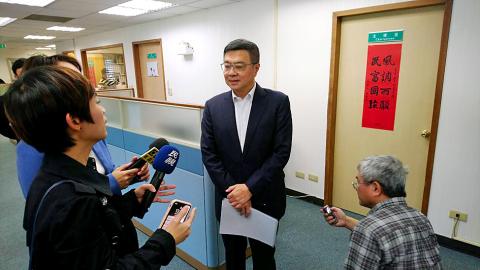Leading Democratic Progressive Party (DPP) members yesterday defended the Central Epidemic Command Center’s (CECC) decision to overturn the Mainland Affairs Council’s (MAC) announcement allowing the entry of Chinese children of Taiwanese and Chinese couples into Taiwan, and praised the Executive Yuan’s quick response.
Officials said that the move could have placed too much burden on already-strained domestic resources in the fight against COVID-19.
DPP Chairman Cho Jung-tai (卓榮泰) lauded the government’s quick response after MAC’s announcement on Tuesday drew a predominantly negative response.

Photo: Chen Yu-fu, Taipei Times
The Executive Yuan was quick in reading the pulse of public opinion, and put a temporary stop to that policy to reflect the will of Taiwanese, Cho told reporters at party headquarters in Taipei.
The council was acting in keeping with policies that are being implemented when it made the announcement on Tuesday. he said.
“However, it is clear that in light of the epidemic, the public believes that the government must prioritize protection of its citizens, and that their welfare must come first,” he added.
Asked if the MAC and other ministries have been rash in making decisions, Cho said that careful assessment and prudent examination are vital in the decisionmaking process.
“It is important that to safeguard Taiwan, government officials must be more flexible and sensitive to the needs and will of the public,” he said.
DPP Legislator Cheng Yun-peng (鄭運鵬) said that Taiwan had in recent years had many interactions with China.
It is not just the MAC, but legislators across parties have received many appeals and requests for assistance, including family problems, he said.
“I can understand that as school is about to reopen, the MAC and other officials have come under a lot of pressure, with appeals and requests for help for students going to school, along with personal and family situations,” he added.
Asked about the policy reversal, Cheng said: “This showed that the decision and its implications were not carefully assessed.”
However, “I am sure that [MAC officials] will be more prudent the next time,” Cheng added.
DPP Legislator Wang Ting-yu (王定宇) said that MAC officials made a “foolish” announcement on Tuesday.
“Right now, most Taiwanese are very worried about the ‘Wuhan virus’ and they are distrustful of the Chinese government,” Wang said. “As such, people were riled up and criticized MAC officials. I see this reaction as a very good thing for Taiwan, as it sends a strong signal of their discontent about the decision.”
“It was a rather foolish decision, and when it was announced I had already told them that the decision should be postponed,” he said.
“With Taiwan still combating the ‘Wuhan virus’ outbreak, which has strained our healthcare resources, and with the MAC failing to come up with a clear explanation, Minister of Health and Welfare Chen Shih-chung (陳時中), the head of the CECC, had to put a stop to the MAC’s policy,” Wang added.

CHANGING LANDSCAPE: Many of the part-time programs for educators were no longer needed, as many teachers obtain a graduate degree before joining the workforce, experts said Taiwanese universities this year canceled 86 programs, Ministry of Education data showed, with educators attributing the closures to the nation’s low birthrate as well as shifting trends. Fifty-three of the shuttered programs were part-time postgraduate degree programs, about 62 percent of the total, the most in the past five years, the data showed. National Taiwan Normal University (NTNU) discontinued the most part-time master’s programs, at 16: chemistry, life science, earth science, physics, fine arts, music, special education, health promotion and health education, educational psychology and counseling, education, design, Chinese as a second language, library and information sciences, mechatronics engineering, history, physical education

The Chinese military has boosted its capability to fight at a high tempo using the element of surprise and new technology, the Ministry of National Defense said in the Quadrennial Defense Review (QDR) published on Monday last week. The ministry highlighted Chinese People’s Liberation Army (PLA) developments showing significant changes in Beijing’s strategy for war on Taiwan. The PLA has made significant headway in building capabilities for all-weather, multi-domain intelligence, surveillance, operational control and a joint air-sea blockade against Taiwan’s lines of communication, it said. The PLA has also improved its capabilities in direct amphibious assault operations aimed at seizing strategically important beaches,

‘MALIGN PURPOSE’: Governments around the world conduct espionage operations, but China’s is different, as its ultimate goal is annexation, a think tank head said Taiwan is facing a growing existential threat from its own people spying for China, experts said, as the government seeks to toughen measures to stop Beijing’s infiltration efforts and deter Taiwanese turncoats. While Beijing and Taipei have been spying on each other for years, experts said that espionage posed a bigger threat to Taiwan due to the risk of a Chinese attack. Taiwan’s intelligence agency said China used “diverse channels and tactics” to infiltrate the nation’s military, government agencies and pro-China organizations. The main targets were retired and active members of the military, persuaded by money, blackmail or pro-China ideology to steal

DEADLOCK: As the commission is unable to forum a quorum to review license renewal applications, the channel operators are not at fault and can air past their license date The National Communications Commission (NCC) yesterday said that the Public Television Service (PTS) and 36 other television and radio broadcasters could continue airing, despite the commission’s inability to meet a quorum to review their license renewal applications. The licenses of PTS and the other channels are set to expire between this month and June. The National Communications Commission Organization Act (國家通訊傳播委員會組織法) stipulates that the commission must meet the mandated quorum of four to hold a valid meeting. The seven-member commission currently has only three commissioners. “We have informed the channel operators of the progress we have made in reviewing their license renewal applications, and